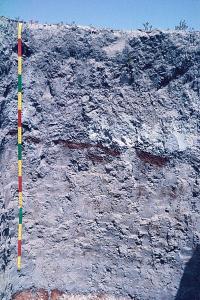Reference soil Mali 05: Fluvisol
Fluvisols typically are young soils in alluvial, deltaic, lacustrine, or marine deposits, and occur all over the world.
Characteristics
Soils having fluvic soil material starting within 25 cm from the soil surface and continuing to a depth of at least 50 cm from the soil surface. They have no diagnostic horizons other than a histic, mollic, ochric, takyric, umbric, yermic, salic, or sulfuric horizon.
Reference soil ML005: Fluvisols
See also data from unit X1 in"Mali land and water resources", 1983, PIRT, mapscale 1:500.000. Oral information indicates that the lake was yearly flooded by the Niger. The flooding stopped due to the blocking of the entrance/outlet by sand dunes. The soil has a very low bulk density. Structure of the Ah horizon is powdery. Porosity is difficult to assess, infact a high micro porosity is present. Effective soil depth is probably limited by platy structure of the subsoil. Texture is probably silt (the soil brought into suspension settles quickly). When the ferro-oxyde mottling is not fossile but caused by stagnant water,the soil will classify as an aquic torriorthent. Monthly precipitation records of the period 1907 to 1985 are available in the file. The windspeed is recorded at a height of 10 meter. Vegetation changes has been monitored by PIRT for the period 1980-1986.
